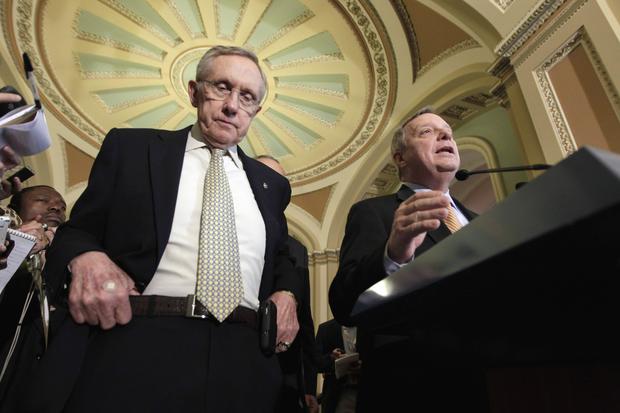Senate Democratic debt plan rejected in the House
Updated at 3:55 p.m. ET
The Republican-led House on Saturday rejected a compromise plan from Senate Majority Leader Harry Reid to raise the debt ceiling, leaving Washington deadlocked with just days left to extend the nation's ability to borrow money.
The Reid plan was rejected 246 to 173, under procedural rules that would have required a two-thirds majority for passage. Every Republican voted against the bill. Eleven Democrats, including seven "blue dog" moderates, also voted against it. House Republicans said they objected to the bill because it includes defense cuts and what they call accounting gimmicks.
Reid's plan "would give the president full freedom to continue his domestic spending spree, while doing nothing to address our out of control deficit," Rep. Buck McKeon, R-Calif., chair of House Armed Services Committee, said in a statement released Saturday. "It makes insignificant reforms to the real driver of our debt, entitlement programs, while hacking away at the dwindling resources needed by our armed forces to keep America safe."
To make his bill more palatable to Republicans, Reid on Friday unveiled a modified version that includes elements from a plan put forward by Senate Republican Leader Mitch McConnell. Senate Democrats this weekend told Republicans that Reid's modified bill was the only way forward, after the Senate defeated an alternative proposal from House Speaker John Boehner on Friday night, less than two hours after it passed the House.
"You've seen the huge difficulties in the House, their inability to even tie their own shoes, and so it's up to the Senate," Sen. Chuck Schumer, D-N.Y., said Friday night. "The only game in town is the modified Reid bill."
Senator: "Ninth inning" debt deal will get doneNation on brink, GOP debt plan dies in Senate
House GOP - finally - passes debt limit plan
Special report: America's debt battle
A procedural vote to move Reid's bill in the Senate is scheduled for Sunday morning at 1 a.m., but Republicans have made clear they're likely to block the bill with a filibuster. Friday, Reid received a letter from 43 Senate Republicans who said they oppose his plan. That leaves Reid with the possible support of just four Republicans -- but if he wants to break a GOP filibuster, Reid will need the support of all 53 senators in the Democratic caucus and at least seven Republicans.
Congress has just days left to raise the $14.3 trillion debt ceiling, the legal limit the U.S. can borrow. If the limit isn't raised by August 2, the Obama administration and others have warned, the U.S. risks defaulting on its loans or neglecting other significant financial obligations, and sending the global economy into a tailspin.
In his weekend radio address, President Obama urged Democratic and Republican lawmakers to reach a deal quickly. "There is very little time," he said.
In the Republican radio address, Sen. Jon Kyl of Arizona said, "Republicans have tried to work with Democrats to avoid this result and put our country on a better path, but we need them to work with us."
Democrats this weekend said just the opposite, particularly after Reid unveiled the modified version of his plan.
"The proposal that I put forward is a compromise -- we changed it even more today," Reid said Friday. "We would have changed it more, but as I indicated on the floor we had no one to negotiate with. The Republican Leader [Mitch McConnell] said he wouldn't negotiate with me."
Part of the $2.4 trillion in savings in Reid's plan comes from winding down the wars in Iraq and Afghanistan, which critics say is an accounting gimmick, since the wars were going to be ended anyway. Like Boehner's rejected plan, it calls for the creation of a bipartisan commission to come up with long-term deficit and debt reduction ideas.
In their letter to Reid, the 43 Republican senators opposed to his plan urged him to "pursue a more responsible course of action that would rein in spending, reassure the financial markets, and help promote private sector job growth."
Some Senate Republicans suggested Friday that Reid's plan could eventually win GOP support. And after the House vote on Saturday, Reid said a number of the Republicans who signed the letter in opposition to his bill had actually reached out to Democrats to try and work with them. "Whether it bears fruit, we will see," he said.
Democrats this weekend charged that McConnell is refusing to let his caucus get on board with the plan.
"There is growing sentiment among senators on both sides of the aisle to sit down and reach a reasonable compromise and to save our economy from the disaster that awaits us if we fail to extend this debt ceiling," Sen. Dick Durbin, D-Ill., said Friday. "What these senators on the Republican side are waiting for is a permission slip from Sen. McConnell."
If both sides do reach some kind of agreement, the 1 a.m. Senate vote on Reid's plan may get rescheduled. Reid and House Democratic Leader Nancy Pelosi are going to the White House this afternoon to update President Obama on the negotiations.

